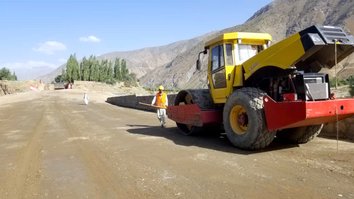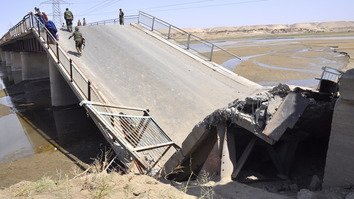KUNDUZ -- A bridge under construction on the Pul-i-Khumri river in Doshi district, Baghlan province, will provide critical access to services and reduce travel time for thousands of families, local residents say.
The bridge, funded by local residents and donations from the Afghan diaspora, will connect about 10,000 families in the Zahrabi area and neighbouring villages with the Doshi district centre.
Construction formally began on March 3, said Mohammad Ayub Hakimi, who oversees the construction work.
"Construction of the bridge, which is 63 metres long and 5 metres wide with an estimated cost of 23.7 million AFN [$273,861], will be completed in the next six months," he said.
![Residents of Doshi district, Baghlan province, hold a ribbon-cutting ceremony on March 3 to launch construction of a bridge funded by locals and Afghan diaspora. [Noorgul Andarwal/Salaam Times]](/cnmi_st/images/2022/03/15/34528-img_1943-585_329.jpg)
Residents of Doshi district, Baghlan province, hold a ribbon-cutting ceremony on March 3 to launch construction of a bridge funded by locals and Afghan diaspora. [Noorgul Andarwal/Salaam Times]
More than 10 million AFN ($115,553) and 1,000 bags of cement have been collected for construction so far.
"I am sure that with the construction of the bridge, roads, schools and clinics will also be constructed," he said. "Unfortunately, our people have been deprived of government services for years."
A dream come true
Construction of the bridge will address travel-related problems of about 10,000 families in the Zahrabi area and surrounding villages, according to locals.
"People have been living in this village for 250 years. They walk daily through water in the river to transport food from the market to their houses," said Mohammad Aslam Utmankhail, a tribal elder in Zahrabi.
Many locals, including children, men and women, have drowned attempting to cross the river, he said.
"Now we are happy that our dream is coming true."
"We would have had schools, clinics and other facilities had the previous governments built a bridge here," he said. "Since there is no road for cars to travel, our children have been deprived of education."
"Locals finally had to take matters into their own hands and started construction," Utmankhail said.
The bridge is important because it connects the nine villages of the Zahrabi area with the market in the Doshi district centre, according to Mohibullah Wardak, a tribal elder from the area.
"In order to go to the Doshi centre, we have to first travel 25km to Pul-i-Khumri and from there to Doshi, while it would be 1km from here to Doshi if there were a bridge."
"We are connected with Pul-i-Khumri via road but not with the Doshi district centre," he said. "We will be able to access clinics quickly and our children will be able to go to school once the bridge is constructed."
Once completed, the bridge will reduce travel costs to Doshi from 300 AFN ($3.47) to 30 AFN ($0.35), he said.
"We all came together and raised funds internally based on our travel costs and asked Afghans abroad to chip in to fund the construction work," said Malem Jan, 57, a tribal elder in Zahrabi.
"We are happy that this bridge will connect a large number of villages in Doshi district to the Baghlan-Kabul highway," he said.
Protecting infrastructures
With construction under way, Baghlan residents say it is up to locals to protect and maintain the bridge.
"Locals must monitor implementation of projects in their areas to ensure the quality of the work and longevity of the project," said Mohammad Daud Sulaimani, a resident of Pul-i-Khumri.
"There are still many challenges residents of remote areas of Baghlan are facing, and we call on the international community to address their problems," said Sibghatullah Hamidi, another resident of Pul-i-Khumri.
"Residents of remote villages in Tala Wa Barfak, Baghlan-e-Markazi, Dahna-i-Ghori, Burka, Nahrin and other districts who have suffered from insecurity and conflict in the last 20 years do not have access to basic services," he said.
"After the [still-unaccomplished] release of the frozen assets of the people of Afghanistan, aid organisations should use those funds to construct infrastructure projects such as clinics, schools, madrassas, bridges, roads, deep wells and agricultural projects," he said.








It makes me happy to see a bridge being built that benefits the people. Surprisingly, in the last 20 years, the government and international organizations have not made a bridge for the region's people to meet their vital needs. Building bridges, roads, electricity, and factories in Afghanistan is essential to create jobs for the people at home and free them from dependence on foreigners, especially Iran and Pakistan.
Reply2 Comment
History has shown that no resource has ever had a decisive role in solving the political, economic and social problems of a society, except the people themselves. Unity can ensure victory in reaching to a certain strategy.
Reply2 Comment